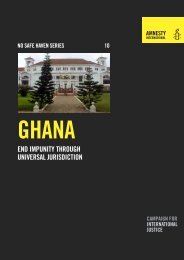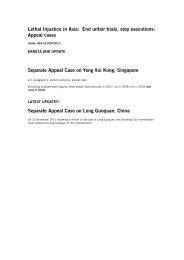read the report - Amnesty International
read the report - Amnesty International
read the report - Amnesty International
Create successful ePaper yourself
Turn your PDF publications into a flip-book with our unique Google optimized e-Paper software.
NIGERIA<br />
‘WAITING FOR THE HANGMAN’<br />
3<br />
1/INTRODUCTION<br />
‘Death penalty is wrong. It is an instrument<br />
of vengeance, not justice... I think it belongs<br />
to <strong>the</strong> past.’<br />
Owens Wiwa, bro<strong>the</strong>r of executed Ogoni activist Ken Saro-Wiwa, speaking in July 2008<br />
The 720-plus men and 11 women “waiting for <strong>the</strong> hangman” in Nigeria’s prisons have one<br />
thing in common, beyond not knowing when <strong>the</strong>y will be put to death. They are poor. From<br />
<strong>the</strong>ir first contact with <strong>the</strong> police, through <strong>the</strong> trial process, to seeking pardon, those with <strong>the</strong><br />
fewest resources are at a serious disadvantage in Nigeria’s criminal justice system. And some<br />
will pay with <strong>the</strong>ir life.<br />
Some death row prisoners were arrested when <strong>the</strong>y went to a police station because <strong>the</strong>y<br />
knew a suspect or had witnessed a crime. Many said <strong>the</strong> police rounded <strong>the</strong>m up and <strong>the</strong>n<br />
demanded money for <strong>the</strong>ir release. Sometimes police asked for money for fuel, without which<br />
<strong>the</strong>y could not go and see witnesses or check alibis. Overstretched and under-resourced,<br />
<strong>the</strong> police rely heavily on confessions ra<strong>the</strong>r than investigations. And in many cases <strong>the</strong>y use<br />
torture to force suspects to sign <strong>the</strong>se statements.<br />
More than half of all <strong>the</strong> death row prisoners in Nigeria were sentenced to death on <strong>the</strong> basis<br />
of a confessional statement. 1 Some tried to challenge <strong>the</strong> statement in court, but <strong>the</strong> trial judge<br />
refused to believe <strong>the</strong>m when <strong>the</strong>y said <strong>the</strong>y had been tortured and insisted that <strong>the</strong> statement<br />
should stand. Some death row prisoners had no lawyer at all – o<strong>the</strong>rs said that <strong>the</strong>ir lawyer<br />
ei<strong>the</strong>r did not argue <strong>the</strong>ir case, or was silenced by <strong>the</strong> trial judge. Often, lawyers were not<br />
allowed to see documents vital to <strong>the</strong> case until <strong>the</strong> trial started. About 80 death row prisoners<br />
were convicted by Robbery and Firearms Tribunals with no right of appeal to a higher court.<br />
These trials fell far short of international standards of fair trial.<br />
Index: AFR 44/020/2008 <strong>Amnesty</strong> <strong>International</strong> October 2008

















